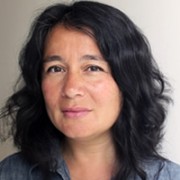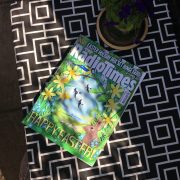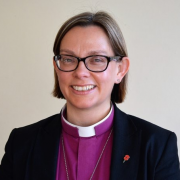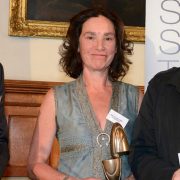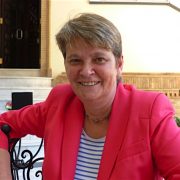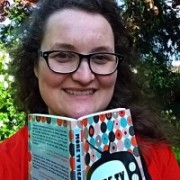What it’s like to study Journalism when the world is on fire
/0 Comments/in Awards, General, journalism /by Shola AdesinaBeyond the God Slot
/0 Comments/in Awards, BBC, Broadcast policy, General, Religious broadcasting /by Bishop Helen-Ann HartleyHow have broadcast and social media been used to support faith during the COVID-19 pandemic?
/0 Comments/in Awards, General, Outreach, Religious broadcasting, Research /by Connie DimsdaleWe need Ambridge back soon
/0 Comments/in Awards, BBC, General, Religious broadcasting /by Bishop Helen-Ann HartleyNo Destination: Sandford St Martin Award Winner to become a Feature Film
/0 Comments/in Awards, BBC, General /by sandford-masterWhy good journalists need religion
/0 Comments/in Awards, General, journalism, news and current affairs /by Nicola MeyrickJimmy McGovern: getting ‘Broken’ on TV
/0 Comments/in Awards, General, Religious broadcasting /by Anna McNameeHow should TV portray people of faith?
/0 Comments/in Awards, BBC, Broadcast policy, General /by Bryony TaylorWe watch a LOT of TV concerning religion, ethics or spirituality here at the Sandford St Martin Trust and so are particularly attuned to any buzz in the Twittersphere or the wider media around the portrayal of faith or the faithful on air. So it was that one of our trustees came across an open letter to the BBC from the Christian evangelist Canon J John and published on his website. Now, before you go any further, please note that at the Trust we don’t share the Canon’s opinions of the BBC’s output. Take a quick look at the shortlist for this year’s Sandford awards and you’ll find several bishops, one priest and many nuns. They appear across genres in dramas, factual and reality programmes – most of them broadcast by the BBC – and, we’d say, all of them realistically and sympathetically portrayed – which was no doubt a contributing factor to how they ended up on the Sandford St Martin shortlist in the first place. If you widen the scope of your survey even further to include people and practitioners of any faith, then you’ll find an even greater number of often nuanced and sensitive explorations of belief.
Bryony Taylor is the author of the very readable and informative “More TV Vicar?” which examines how Christians are representing on popular TV programmes and the soon-to-be Rector of Barlborough and Clowne in Derby Diocese. She has also been a stalwart of our awards shortlisting team for several years now and is something of an expert when it comes to how faith is portrayed on the telly. Her thoughts about how Christians are represented by the BBC, written in response to J John’s letter, below, was first published on her own website. She has generously given us permission to reproduce it here. If you want to read more about how “ordinary” Christians have been represented on TV then I’d recommend that part of her book dedicated to EastEnders’ Dot Cotton in addition to this blog and the readers’ replies on the Accultured website which also examine how mainstream programmes like “Suits” or “The Simpsons” deal with faith.
Representation of Christians on the BBC – my response to J John’s open letter
By Bryony Taylor
A few weeks ago Canon J John published an open letter to the BBC about its poor representation of Christians and Christianity on the BBC. He chooses two very obscure examples (a 4 minute film about motivational speaker Nic Vujicic on the London local BBC website and a documentary about Usain Bolt) to decry the fact that their Christian faith is not referred to in either programme. J John then goes on to say:
“So we come across the bumbling and inoffensive ‘More Tea Vicar’ cleric who is clearly related to Mr Bean; the sort of edgy figure apparently portrayed in the current drama Collateral who is a lesbian vicar in a relationship with a drug-taking illegal immigrant; or (perhaps increasingly) the naive ‘happy-clappy’ charismatic, untroubled by reality of any form. Where are the mainstream figures? Those people – doctors, teachers, MPs, mothers, even vicars – who have a conventional, thoughtful Christian faith and who happily live it out in their daily lives? I’m not asking for perfection but I would like representation.”
This is entirely the territory that I explore in my book More TV Vicar? I did argue at the time I wrote it that the reason we don’t see ordinary Christians portrayed on television is largely because they’re not that entertaining to watch! I’ve had to eat my words, however, a fair bit in the last year or so as we’ve seen TV series like Broken (about which I have written with some friends a forthcoming discipleship course) that not only portrays Christians but Christian worship in every single episode. Call the Midwife (to which J John does refer, somewhat reluctantly I feel) is also one of the best portrayals of ordinary people of faith on television – and this has a very large audience. We had A Vicar’s Life – a four part documentary about the lives of 4 priests in rural Herefordshire on the BBC in January. This last year we have seen quite a high proportion of Christians on the BBC and largely from a very positive perspective. It makes me wonder what J John is watching. I’d like to know the programmes in which he’s seen the bumbling vicar stereotype recently – I haven’t seen one for years. J John also complains about Thought for the Day suggesting that the (Christian I presume) speakers believe less than their listeners (which is just an absurd claim). Thought for the Day is not a spot for evangelism: it’s a privileged 3 minutes taken out of a 3 hour programme to allow for just that: something that will stimulate thought about the things of the spirit
The BBC are actually working quite hard (as outlined in this article here) to respond to the perceived ‘anti-Christian’ bias through their Easter programming which includes Pilgrimage: The Road to Santiago – about some celebrities walking the Camino together.
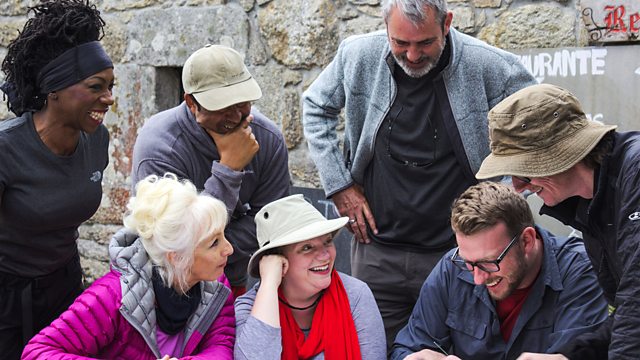
I’m not quite sure where J John is coming from in writing this open letter. He refers (slightly skirting around the topic) to LGBTQ issues and Christianity – I think implying that he thinks that Christians who are not affirming of LGBTQ people should be able to have a voice and treated with respect. What he perhaps is feeling uncomfortable about is that non-affirming Christians are beginning to be in the minority now, even in evangelical circles. He also brings out the old chestnut ‘you wouldn’t say that about Islam’.
I can’t help but feel that there is an element of the adage ‘when you’re accustomed to privilege, equality feels like oppression’ about this open letter. Just because other religions are handled on television too doesn’t mean that Christianity is being ‘airbrushed out’ or deliberately ignored. It reminds me of how when I began my ministry coming into a parish with a female rector and associate priest (meaning that I’m in an all-female ministry team) of how some people said to me ‘that doesn’t sound very healthy’ – completely forgetting the fact that for centuries every single ministry team has been all male and no one ever felt that would be ‘unhealthy’.
J John’s demands at the end of the letter are as follows:
“To conclude, what would I say we Christians are asking for from the BBC? I think we are asking for three things. First, we would like fairness: can we be treated in the same way as other faiths are treated? Second, we would like courage: a decision to present both Christianity and Christians as they exist in reality (past and present) rather than by ignoring or stereotyping them. Third, we would like to see an earnestness that would look at the issues of faith with intelligence and insight. Can we be treated seriously? Please?”
I would suggest that the BBC are already doing most of this. Being on the shortlisting panel for the Sandford Awards has given me a great opportunity to view some superb religious programming – much of it from the BBC. I would suggest J John and those who agree wholeheartedly with his letter have a look at this year’s nominees for the Sandford Awards and see how Christians are far from being ignored and how issues of faith are looked at with intelligence and insight on British television.
CONTACT US
Sandford St Martin Trust
Church House
Great Smith Street
London
SW1P 3AZ
Email: info@sandfordawards.org.uk
Tel: 07749875477
Recent blog posts
- Shared language for the soul June 20, 2024
- Film and TV Charity survey May 31, 2024
- Faith in the Future April 2, 2024
JOIN OUR COMMUNITY
At the Sandford St Martin Trust we’re interested in how religion and belief are portrayed in the broadcast media. We believe that faith – whether you have it or not – plays a complex role in human experience and that a better understanding of what people believe can support stronger secular communities. Think that sounds interesting? Why not sign up for our newsletter and join us at one of our forthcoming events aimed at stimulating and contributing to the debate around what is good religious content.
We look forward to meeting you!


